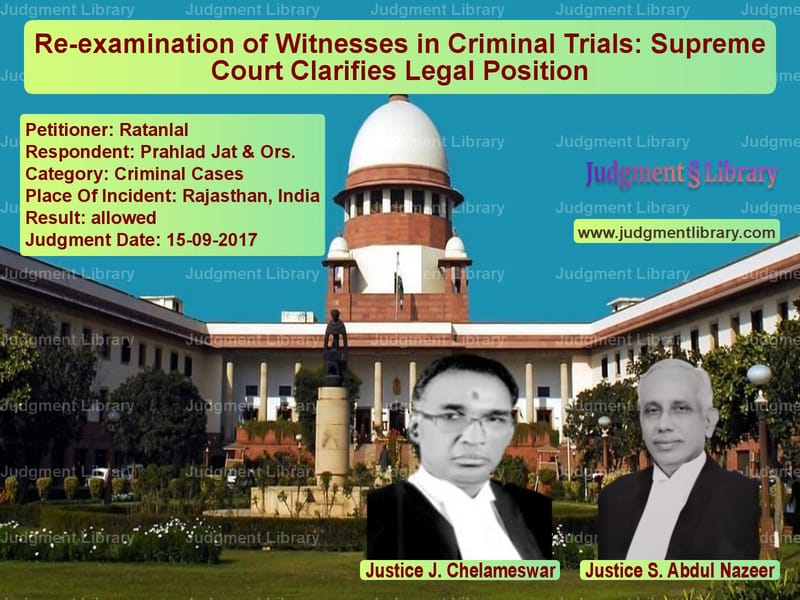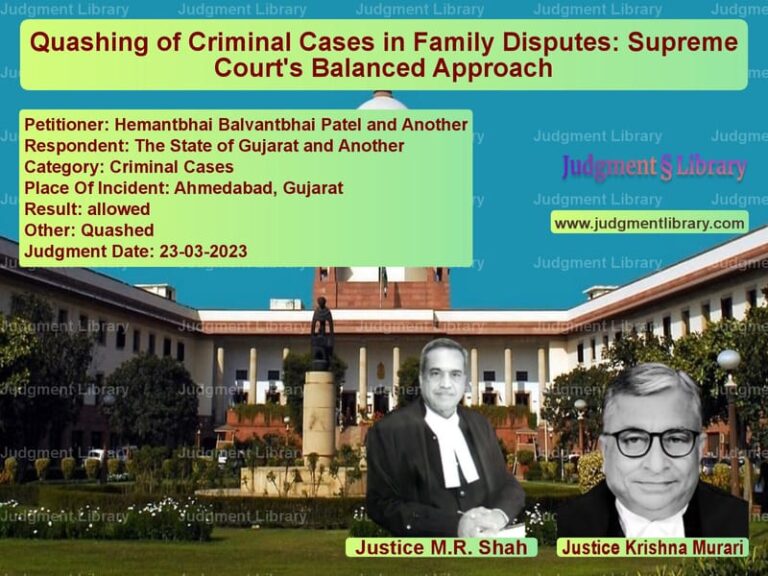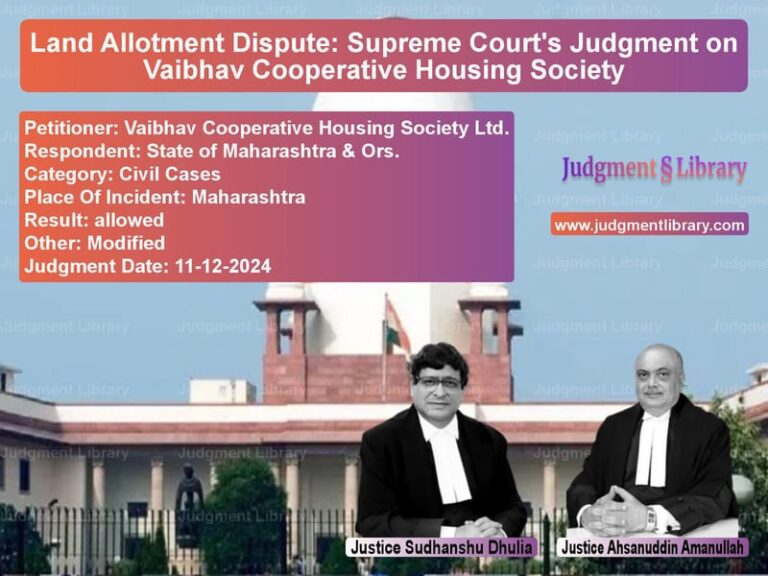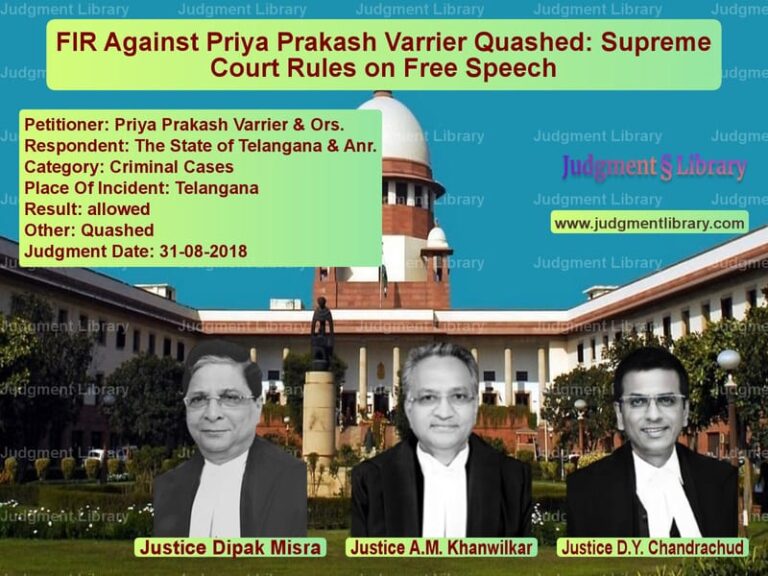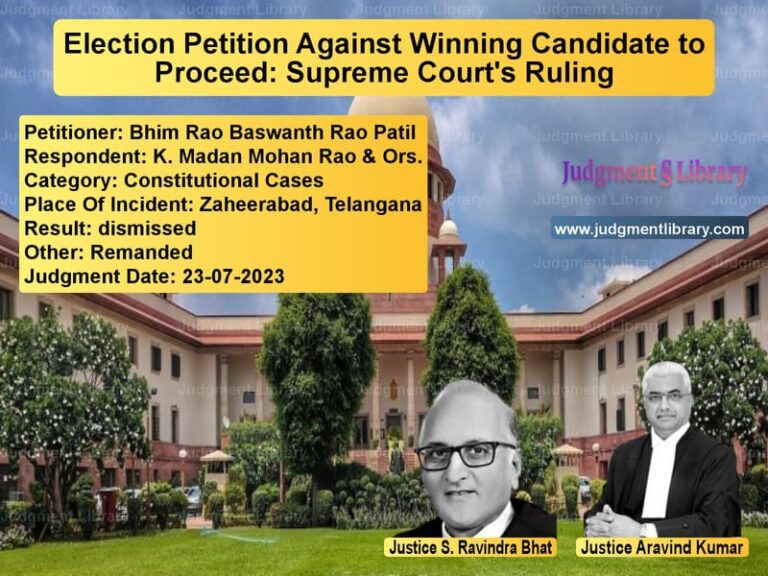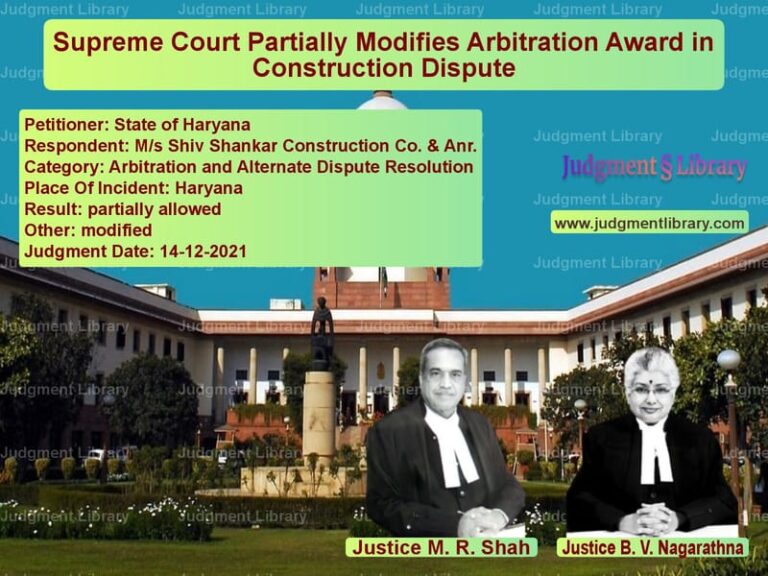Re-examination of Witnesses in Criminal Trials: Supreme Court Clarifies Legal Position
The Supreme Court of India, in the case of Ratanlal v. Prahlad Jat & Ors., addressed the issue of re-examination of witnesses under Section 311 of the Code of Criminal Procedure (CrPC). The judgment, delivered on September 15, 2017, by a bench comprising J. Chelameswar and S. Abdul Nazeer, provided clarity on the discretionary powers of courts in recalling witnesses and the necessity to prevent misuse of this provision.
Background of the Case
The case arose from a criminal trial in Rajasthan, where a charge sheet was filed against multiple accused under Sections 302, 201, 342, and 120-B of the Indian Penal Code (IPC). The trial had progressed with the statements of 28 witnesses being recorded, including two key witnesses, PW4 and PW5. Initially, these witnesses supported the prosecution’s case.
However, after a period of 14 months, PW4 and PW5 filed applications before the Sessions Judge, seeking re-examination under Section 311 of the CrPC. They claimed that their initial statements were made under police pressure and that the accused had no role in the incident. The Sessions Judge dismissed these applications, stating that their cross-examinations had been thorough and that their claims of coercion were unsubstantiated.
The accused then approached the Rajasthan High Court, which allowed the applications and directed the re-examination of PW4 and PW5. Aggrieved by this order, the appellant, a family member of the deceased and a prosecution witness, approached the Supreme Court.
Legal Issues
The case primarily revolved around the following legal questions:
- Does the appellant have the locus standi to challenge the High Court’s order?
- Can witnesses be recalled under Section 311 of the CrPC after a long delay, without justifiable reasons?
- What is the scope of judicial discretion under Section 311 of the CrPC?
Arguments of the Petitioner
The petitioner, Ratanlal, contended:
- That PW4 and PW5 had already given their statements in court, had been cross-examined, and had supported the prosecution’s case.
- That the recall application was filed after a delay of 14 months without any reasonable justification.
- That the re-examination of these witnesses would only serve to assist the accused in an unfair manner.
- That the High Court erred in setting aside the well-reasoned order of the Sessions Judge.
Arguments of the Respondents
The respondents argued:
- That under Section 311 of the CrPC, courts have the power to recall witnesses if it is necessary for a just decision of the case.
- That PW4 and PW5 had been coerced into giving statements against the accused and should be given an opportunity to correct their testimonies.
- That ensuring a fair trial required the consideration of new evidence, even if it meant re-examining witnesses.
Supreme Court’s Analysis
Locus Standi of the Appellant
The Supreme Court addressed whether the appellant had the legal standing to challenge the High Court’s order. It noted:
“Locus standi is a concept foreign to criminal jurisprudence. Anyone can set the criminal law in motion except where the statute enacting or creating an offence indicates to the contrary.”
The Court referred to A.R. Antulay v. Ramdas Sriniwas Nayak (1984), which held that an offence is not just against an individual but against society, and that criminal proceedings can be pursued in the interest of justice by any interested party.
Judicial Discretion Under Section 311 of the CrPC
Section 311 of the CrPC states:
“Any Court may, at any stage of any inquiry, trial or other proceeding under this Code, summon any person as a witness, or examine any person in attendance, though not summoned as a witness, or recall and re-examine any person already examined; and the Court shall summon and examine or recall and re-examine any such person if his evidence appears to it to be essential to the just decision of the case.”
The Court emphasized that while this provision grants wide discretion, it must be exercised judiciously and not arbitrarily. The objective is to ensure justice for both the accused and the prosecution, preventing any party from manipulating the process.
Key Judicial Precedents Considered
The Court examined previous rulings:
- Zahira Habibullah Sheikh v. State of Gujarat (2006): Held that recalling witnesses should be done only when necessary to prevent miscarriage of justice.
- State (NCT of Delhi) v. Shiv Kumar Yadav (2016): Ruled that mere observation that recall is necessary “for ensuring fair trial” is not enough without tangible reasons.
- Vijay Kumar v. State of Uttar Pradesh (2011): Stated that Section 311 must be used judicially and not for delaying trials.
Ruling on the Delay in Filing the Recall Application
The Court found that PW4 and PW5 had been examined and cross-examined in 2010 and 2011, yet they waited 14 months to file applications for re-examination. The Court noted:
“The delay in filing the application is one of the important factors which has to be explained in the application. In this case, no reason for the delay was given, indicating that the witnesses were likely influenced.”
Final Judgment
The Supreme Court ruled in favor of the appellant and set aside the High Court’s order, stating:
“The Sessions Judge was justified in rejecting the applications of PW4 and PW5. The High Court was not right in setting aside the order. The trial court is directed to proceed with the matter without considering the re-examined testimonies of PW4 and PW5.”
Conclusion and Impact
This judgment reaffirms that while courts have the power to recall witnesses, such powers must be exercised carefully to prevent abuse. The ruling ensures that trials are conducted fairly, without undue influence or manipulation by either party. It also sets a precedent that undue delay in filing recall applications, especially in serious criminal cases, should not be entertained without strong justifications.
Don’t miss out on the full details! Download the complete judgment in PDF format below and gain valuable insights instantly!
Download Judgment: Ratanlal vs Prahlad Jat & Ors. Supreme Court of India Judgment Dated 15-09-2017.pdf
Direct Downlaod Judgment: Direct downlaod this Judgment
See all petitions in Bail and Anticipatory Bail
See all petitions in Attempt to Murder Cases
See all petitions in Fraud and Forgery
See all petitions in Judgment by J. Chelameswar
See all petitions in Judgment by S. Abdul Nazeer
See all petitions in allowed
See all petitions in supreme court of India judgments September 2017
See all petitions in 2017 judgments
See all posts in Criminal Cases Category
See all allowed petitions in Criminal Cases Category
See all Dismissed petitions in Criminal Cases Category
See all partially allowed petitions in Criminal Cases Category

